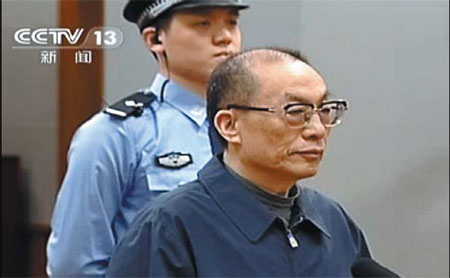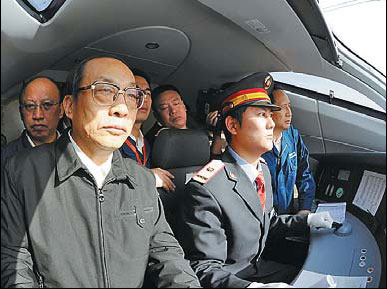Ex-railways minister found guilty
Updated: 2013-07-09 07:08
By Xinhua and chinadaily (China Daily)
|
||||||||
|
Former railways minister Liu Zhijun stands in the dock in a courthouse in Beijing on Monday. Liu was given a suspended death sentence for "especially huge" bribe-taking, becoming the highest-ranking official to be punished for corruption since China's new leaders took office. Xinhua |
|
Then railways minister Liu Zhijun (left) monitors the operation of a new high-speed train in Bengbu, Anhui province, on Dec 3, 2010. Chen Shugen / Xinhua |
60-year-old Liu sentenced to death suspended for two years for bribery
Former railways minister Liu Zhijun was sentenced to death, suspended for two years, on Monday for bribery and abuse of power.
The Beijing No 2 Intermediate People's Court deprived the 60-year-old of his political rights for life and confiscated all his personal property for taking bribes. Liu was also sentenced to 10 years in jail for abuse of power, according to the court verdict.
Qian Lieyang, Liu's lawyer, said after the judgment that they will not appeal to a higher court, but he declined to comment further.
The court found that from 1986 to 2011, Liu took advantage of his positions as an official of local railway bureaus as well as the now-defunct Ministry of Railways to help 11 people, including Shao Liping and Ding Yuxin, win promotions and project deals. Liu accepted 64.6 million yuan ($10.53 million) in bribes from them during that period.
In addition, when he was railways minister, Liu helped Ding and her relatives win contracts for cargo transportation and railway construction.
Liu also helped Shao and Ding acquire shares in a bullet train wheel set company, and assisted with enterprise financing by breaking regulations and showing favoritism. This allowed Ding and her family to reap huge profits. The court held that Liu's accepted bribes involved a huge amount of money with especially serious circumstances.
His abuse of power had caused huge losses in public assets, violating the rights and interests of the State and the people, the court said.
The court confirmed that Liu confessed to his crimes, and provided further clues of the bribery that investigators had not known.
Most of the bribes and the majority of the economic losses caused by his abuse of power have been recovered.
Liu's crime of accepting bribes, which violated the integrity of a State official's duty behavior and undermined the State functionary's reputation, should be given the death penalty. However, because of his admission of guilt and repentance, Liu was given the death penalty with a reprieve, the court said.
The court said that although most economic losses have been recovered, leniency will not be given regarding Liu's abuse of power, as it is especially serious in terms of both circumstances and consequences.
A death sentence with a two-year reprieve is usually converted to a long jail term in China if the defendant is not found guilty of more crimes during the period.
Judge's comments
Bai Shanyun, the trial judge and vice-president of Beijing No 2 Intermediate People's Court, said the Second Branch of Beijing Municipal People's Procuratorate filed the charges against Liu with the court on April 10.
The court later set up a collegial panel and opened the trial to the public on June 9. According to Article 386 and Clause 1 of Article 383 of the Criminal Law, such violators should receive capital punishment, Bai said.
However, as there were circumstances that may warrant a lighter punishment, the court decided instead to hand down its sentence of a death penalty with a two-year reprieve.
First, Liu confessed his crime, including some acts of bribe-taking that were unknown to investigators. Prosecutors and Liu's defense counsel had stated in the trial that according to law, such circumstances may warrant leniency.
The court also found that the eighth amendment to the Criminal Law and a judicial interpretation issued by the Supreme People's Court allows for a lighter punishment under such circumstances, Bai said.
Second, Bai said Liu and his family members cooperated with investigators who confiscated the illegal gains.
According to an interpretation jointly issued by the Supreme People's Court and the Supreme People's Procuratorate, such criminals may be given a lighter penalty, Bai said.
The document also stipulated that in bribe-taking-related cases where criminals and their families or friends have voluntarily surrendered the illegal gains or cooperated with law enforcement officials to confiscate such gains, the court should make a difference in its sentencing from those cases where there is no such behavior, the judge said. Such behavior also demonstrated Liu's repentance that may call for a mitigated sentence, Bai said.
Furthermore, Liu was also cooperative when confessing and showed his penitence during the investigation, prosecution and trial procedures, Bai said.
Taking all the facts of the whole case and Liu's behavior into consideration, the court holds that an immediate execution is not necessary, the judge said.
Property seized
According to the trial, due to Liu's abuse of power, Ding and other businesspeople raked in more than 3 billion yuan worth of profits. Judicial authorities seized and froze large amounts of cash, stocks, properties and works of art, among other assets owned by Ding and other businesspeople, Bai said. The seized and frozen assets included 374 properties and cash. However, they were not criminal gains of Liu, but illegal profits that Ding and other businesspeople obtained through Liu's abuse of power, which highlighted the gravity of Liu's crime, Bai added.
Based on judicial authorities' assessment of the total value of these assets, the court found the majority of economic losses inflicted by Liu's abuse of power had been recovered.
However, considering Liu's especially serious crimes of abuse of power and showing favoritism, the court did not mitigate his punishment, instead sentencing him to 10 years in jail, a maximum sentence for the crime of abuse of power, Bai said.
Previous media reports have revealed that 49 million yuan out of the total 64.6 million was spent by Ding to benefit Liu. Whether this part of the money should be regarded as bribes to Liu has been a point of contention. Bai confirmed that this was a disputed issue between the prosecution and the defense during the trial.
According to Bai, Liu told Ding to "grease the wheels" and handle other relevant affairs for him. Ding spent 49 million yuan to comply with Liu's orders.
"It is unlike an ordinary bribe-taking act in which one receives bribes directly, as Liu has not directly possessed this money, and Liu's lawyers also argued that this act does not constitute a bribe-taking crime," Bai said. However, evidence during the trial revealed that Liu had taken advantage of his positions to help Ding and her relatives obtain huge economic benefits.
Liu also suggested that Ding buy off officials and people to free him of any implication in the case of He Hongda, a former senior official of the Ministry of Railways investigated for corruption, as well as to create favorable conditions for him to secure a better position. Liu confessed that he was fully aware beforehand that such manipulation may cost a lot of money, and Ding informed him afterwards that she spent tens of millions of yuan to carry out his instructions, the judge said.
"Although Liu did not directly take this money, the money was used by Ding at the behest of Liu and for the benefit of Liu," Bai said.
Ding also testified that she spent large amounts for Liu in return for his help for her to reap huge profits, according to the judge.
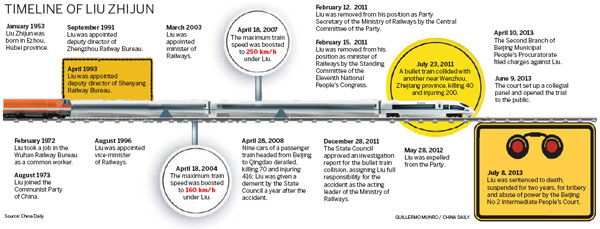
(China Daily USA 07/09/2013 page4)
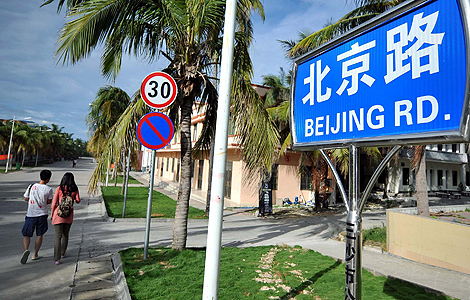
 China's youngest city glistens under palm trees
China's youngest city glistens under palm trees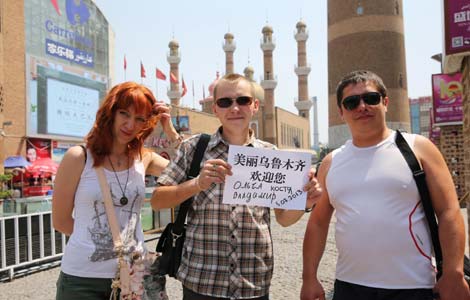
 Xinjiang tourism recovering
Xinjiang tourism recovering
 Quebec disaster death toll jumps to 13
Quebec disaster death toll jumps to 13
 Mourn for students in San Francisco air crash
Mourn for students in San Francisco air crash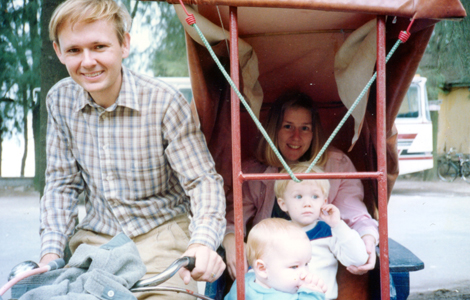
 Rolling stone finally settles
Rolling stone finally settles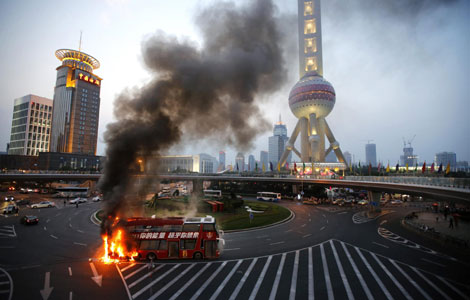
 Double-decker bus caught fire in Shanghai
Double-decker bus caught fire in Shanghai
 China, Russia begin live-fire navy drill
China, Russia begin live-fire navy drill
 Grape expectations for Xinjiang county
Grape expectations for Xinjiang county
Most Viewed
Editor's Picks

|

|

|

|

|

|
Today's Top News
Air crash victims' families arrive in SF
Hopes are high for US, China talks
Laden's life on the run revealed
US mulls hastening withdrawal from Afghanistan
China's inflation grows 2.7% in June
Country singer Randy Travis in critical condition
Police look for suspects in Brazil soccer slaying
Nuclear power pricing system launched
US Weekly

|

|
